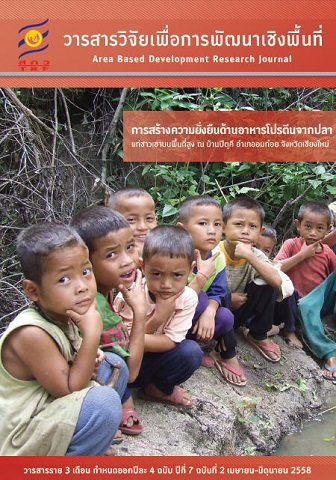การสร้างความยั่งยืนด้านอาหารโปรตีนจากปลา แก่ชาวเขาบนพื้นที่สูง ณ บ้านปิตุคี อำเภออมก๋อย จังหวัดเชียงใหม่
Main Article Content
Abstract
บทคัดย่อไม่สมบูรณ์
The sustainability of protein sources from fish for highland hill tribe peoples at Baan Pitukee Omkoi District, Chiangmai Province
Less protein consumption of hill tribe peoples were solved by sustainable fish culture. This report was the integration of science and social sciences technique for sustainability of the lives of them. The main problem was solved by combining new technique of fish culture and aquatic local wisdom. The academic researchers and students have transmitted the knowledge technology to targeted communities in order to upgrade their pre-historic aquacultural practice to semi-modernization aquaculture activities. This activity is one of the teaching and learning process in social responsibility university, where its main tasks are the provision of the academic services, volunteer work and environmental protection, creating healthy society, as well as preserving culture and tradition, cultivating good morality, leadership ability and management skill of students. The first phase of implementation is to bring about a change in attitude that has taken about 1 year, then the fish culture, to be used as food and semi-artificial breeding, was started in the later year.
This process gave results in three aspects: A) Output, practical knowledge i.e. 1) the sustainability of the fish culture among the villagers, 2) the sustainability of fish fingerlings, and knowledge on the fish culture process/procedure. B) Outcome, knowledge and community management i.e. 1) the sustainability of success of fish culture that are consequently increased of protein sources from fish culture, 2) the sustainability of the fish culture process and community market to diversify its community agricultural product, as well as the exchange of knowledge between communities and also good interrelationships between the community, 3) community local experts of fish culture were trained, and later willingly transferred their wisdom to other people, and 4) students with knowledge of the practical experience and of the technology transfer. And C) Impact as follows: 1) More opportunities and available time to practice other occupations, due to the existing protein sources in the village, 2) the sustainability of drugs prevention because of the reduction of poverty which is the main cause of drug problems, 3) sustainability of familial relation and local culture, due to the availability of 4 requisites i.e. food, career and earnings, which led to the reduction of labor migration, 4) sustainability of education resulting from the increase of self-learning, experiential learning, the provision of community fund for young villagers who are expected to be future of the community strength, 5) the sustainability of aquatic resources, when people with expertise in breeding fish can be bred local fish as a food and conservation purpose, and 6) the success of the creation of desirable graduates.
Article Details
Area Based Development Research Journal values copyright protection and licensing to safeguard author rights and facilitate the appropriate dissemination of research. Our policies ensure openness, accessibility, and attribution. Authors retain copyright ownership, and articles are published under a Creative Commons Attribution License (CC BY), allowing sharing, adaptation, and proper attribution. Authors have the freedom to publish under the CC BY license, granting broad reuse and distribution permissions. The journal supports posting articles on third-party repositories, adhering to institutional and funding restrictions. Author guidelines detail copyright and licensing requirements, empowering authors with knowledge about their rights and responsibilities. These policies cultivate an environment of collaboration, openness, and responsible sharing, benefiting authors and the research community while honoring intellectual property rights.


